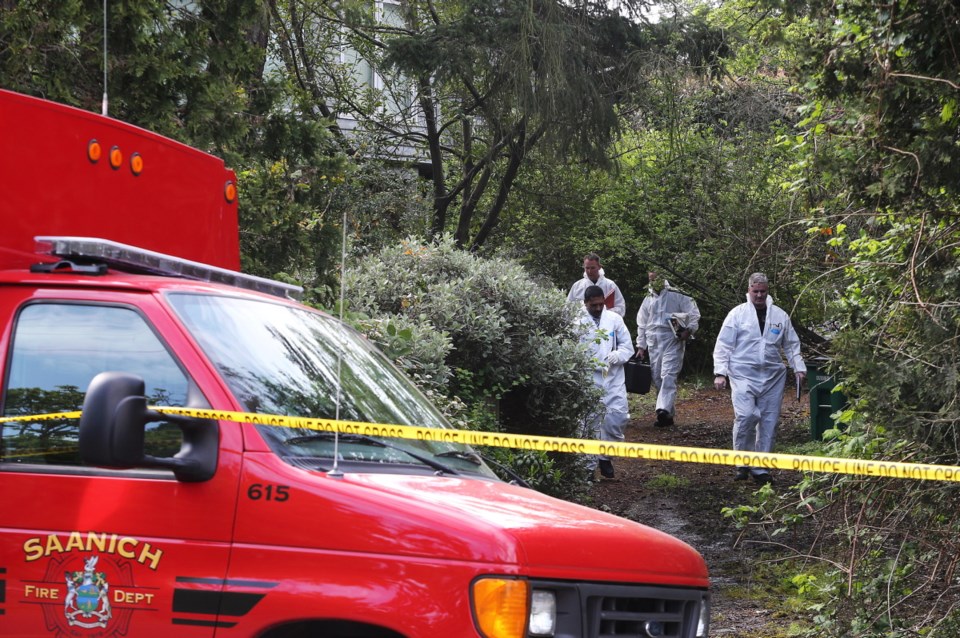The family of the woman found dead inside their home in the Cordova Bay area of Saanich last week said a coroner’s report confirmed Julie Khurana was killed by her husband, Peter Vinoo Khurana, who then set fire to the home before hanging himself.
Julie Khurana suffered serious domestic abuse over the course of her relationship with her husband, said her brother-in-law, Kelly Tarpley. He said Julie often called police to the Saanich home when Peter Khurana was violent, but he would be back in the house by the next day.
Tarpley and his wife, Kathy, live in Palm Springs, Florida. He said his wife communicated with her sister via email every day.
After March 30, the emails from Julie stopped.
Kathy couldn’t reach Julie by phone and after three weeks, the couple became so concerned they considered contacting police.
It was too late. They got a call from the U.S. consulate informing them Julie was the suspected victim in a murder-suicide.
Saanich police and fire departments were called to the home at 4904 Cordova Bay Rd. at 3:27 a.m. on April 21 after someone saw smoke billowing out.
Once firefighters had put out the blaze, two bodies were found inside. One dog was rescued and another dog was found dead in the home.
The Vancouver Island Integrated Major Crime Unit launched an investigation but has released little information.
Julie’s body was so badly damaged from blunt-force trauma to the head and face, and the subsequent fire, it took the B.C. Coroners Service almost a week to identify her, Tarpley was told.
Julie had talked with her sister and brother-in-law about leaving the abusive relationship, but didn’t want to leave their two dogs and didn’t have enough money to support herself, Tarpley said. “He beat her up so many times, I lost count,” he said.
“I’ve done everything short of coming up there and dragging her out of the house.
“He’s been escorted out of the house five or six times in the last five or six months.”
Saanich police would not confirm how many times they were called to the home before April 21.
Julie Khurana had few friends in Victoria and rarely socialized with neighbours, Tarpley said.
“She was like a hermit in that house,” he said. “Peter didn’t let her have any friends because he would lose his control.”
Tarpley said he hopes Julie’s story will serve as a cautionary tale to women suffering from domestic abuse. “The only thing I can hope for is it might keep some other woman from being killed,” he said.
Peter Khurana was born in India in 1956. He and his mother moved to Switzerland, where he met his first wife, Irene Khurana. The couple moved to Canada and Peter Khurana bought the Cordova Bay Road home in 1998.
Irene Khurana told the Times Colonist last week that her ex-husband had a violent temper and she tried to get a restraining order against him in 2004. The couple divorced in 2006.
Peter Khurana met Julie online through a stock-trading website and she left her home in Louisville, Kentucky, to be with him in Victoria around 2007.
At one point, the couple moved to Mackenzie, a town about 180 kilometres north of Prince George, where Peter Khurana ran a dental practice.
It was there that he was charged with assault causing bodily harm against Julie in December 2013.
Peter Khurana pleaded guilty to the lesser offence of assault. He was sentenced to one day in jail and one year of probation.
He was released on conditions that included avoiding alcohol or drugs and attending counselling. He was not allowed to contact Julie, but the couple continued to live together back in Victoria.
In January 2014, he was charged with breaching those conditions and sentenced to another day in jail.
Parm Kroad, deputy director of the Victoria Women’s Transition House, said women thinking of leaving an abusive relationship can call the 24-hour crisis line at 250-385-6611.
“We can provide a safety plan, tips they need to prepare in advance to leave,” Kroad said, such as having a suitcase ready or money stashed away to take a cab.
Kroad said it’s up to the woman to decide whether to report the abuse to police, but transition house staff can connect women with legal, financial and housing support services or counselling.
This is a corrected version of an earlier story.



